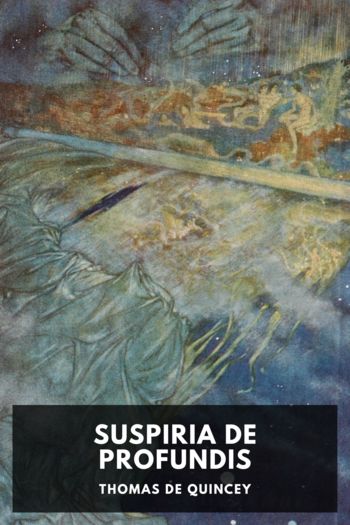Suspiria de Profundis by Thomas De Quincey (urban books to read .TXT) 📕

- Author: Thomas De Quincey
Book online «Suspiria de Profundis by Thomas De Quincey (urban books to read .TXT) 📕». Author Thomas De Quincey
Under this steady though rapid anticipation of the evil which might be gathering ahead, ah! what a sullen mystery of fear, what a sigh of woe, was that which stole upon the air, as again the far-off sound of a wheel was heard! A whisper it was—a whisper from, perhaps, four miles off—secretly announcing a ruin that, being foreseen, was not the less inevitable; that, being known, was not therefore healed. What could be done—who was it that could do it—to check the storm-flight of these maniacal horses? Could I not seize the reins from the grasp of the slumbering coachman? You, reader, think that it would have been in your power to do so. And I quarrel not with your estimate of yourself. But, from the way in which the coachman’s hand was viced between his upper and lower thigh, this was impossible. Easy was it? See, then, that bronze equestrian statue. The cruel rider has kept the bit in his horse’s mouth for two centuries. Unbridle him for a minute, if you please, and wash his mouth with water. Easy was it? Unhorse me, then, that imperial rider; knock me those marble feet from those marble stirrups of Charlemagne.
The sounds ahead strengthened, and were now too clearly the sounds of wheels. Who and what could it be? Was it industry in a taxed cart? Was it youthful gaiety in a gig? Was it sorrow that loitered, or joy that raced? For as yet the snatches of sound were too intermitting, from distance, to decipher the character of the motion. Whoever were the travellers, something must be done to warn them. Upon the other party rests the active responsibility, but upon us—and, woe is me! that us was reduced to my frail opium-shattered self—rests the responsibility of warning. Yet, how should this be accomplished? Might I not sound the guard’s horn? Already, on the first thought, I was making my way over the roof of the guard’s seat. But this, from the accident which I have mentioned, of the foreign mails being piled upon the roof, was a difficult and even dangerous attempt to one cramped by nearly three hundred miles of outside travelling. And, fortunately, before I had lost much time in the attempt, our frantic horses swept round an angle of the road which opened upon us that final stage where the collision must be accomplished and the catastrophe sealed. All was apparently finished. The court was sitting; the case was heard; the judge had finished; and only the verdict was yet in arrear.
Before us lay an avenue straight as an arrow, six hundred yards, perhaps, in length; and the umbrageous trees, which rose in a regular line from either side, meeting high overhead, gave to it the character of a cathedral aisle. These trees lent a deeper solemnity to the early light; but there was still light enough to perceive, at the further end of this Gothic aisle, a frail reedy gig, in which were seated a young man, and by his side a young lady. Ah, young sir! what are you about? If it is requisite that you should whisper your communications to this young lady—though really I see nobody, at an hour and on a road so solitary, likely to overhear you—is it therefore requisite that you should carry your lips forward to hers? The little carriage is creeping on at one mile an hour; and the parties within it, being thus tenderly engaged, are naturally bending down their heads. Between them and eternity, to all human calculation, there is but a minute and a half. Oh heavens! what is it that I shall do? Speaking or acting, what help can I offer? Strange it is, and to a mere auditor of the tale might seem laughable, that I should need a suggestion from the Iliad to prompt the sole resource that remained. Yet so it was. Suddenly I remembered the shout of Achilles, and its effect. But could I pretend to shout like the son of Peleus, aided by Pallas? No: but then I needed not the shout that should alarm all Asia militant; such a shout would suffice as might carry terror into the hearts of two thoughtless young people and one gig-horse. I shouted—and the young man heard me not. A second time I shouted—and now he heard me, for now he raised his head.
Here, then, all had been done that, by me, could be done; more on my part was not possible. Mine had been the first step; the second was for the young man; the third was for God. If, said I, this stranger is a brave man, and if indeed he loves the young girl at his side—or, loving her not, if he feels the obligation, pressing upon every man worthy to be called a man, of doing his utmost for a woman confided to his protection—he will at least make some effort to save her. If that fails, he will not perish the more, or by a death more cruel, for having made it; and he will die





Comments (0)